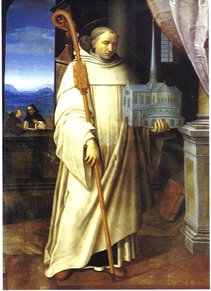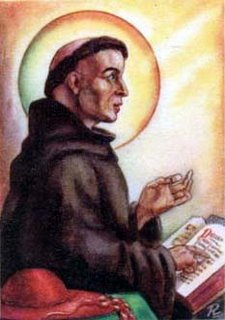 |
| Saint James the Less |
 |
| Saint Philip |
JAMES, the son of Cleophas, called the Less, and on account of his sanctity surnamed the Just, and for his kinship with Christ known as His brother, was, with his brothet Judas Thaddeus, chosen an apostle in the second year of Christ's ministry. Saint James was the first Bishop of Jerusalem. One day, being requested to preach against Christ, he publicly proclaimed Him to be the Messias, in Whom men were bound to believe, at which the Jewish priests became so enraged that they threw him down from a pinnacle of the temple, cast stones upon him, and finally killed him outright with a fuller's rod.
The Introit of the Mass is as follows:
In the time of their tribulation they cried to Thee, O Lord, and Thou heardest them from heaven. Rejoice in the Lord, ye just; praise becometh the upright."
Glory be to the Father, and to the Son, and to the Holy Spirit. As it was in the beginning, is now, and ever shall be, world without end. Amen.
Prayer
O God, Who givest us joy by the annual solemnity of Thy apostles Philip and James, grant, we beseech Thee, that we may be instructed by the example of those in whose merits we rejoice. Through Christ our Lord, Amen.
Epistle: Wisdom 5:1-5
The just shall stand with great constancy against those that have afflicted them, and taken away their labors. These seeing it, shall be troubled with terrible fear, and shall be amazed at the suddenness of their unexpected salvation, saying within themselves, repenting, and groaning for anguish of spirit. These are they whom we had some time in derision, and for a parable of reproach. We fools esteemed their life madness, and their end without honor. Behold how they are numbered among the children of God, and their lot is among the saints.
Gospel: John 14:1-13
At that time Jesus said to His disciples: Let not your heart be troubled. You believe in God, believe also in Me. In My Father's house there are many mansions. If not, I would have told you, that I go to prepare a place for you. And if I shall go, and prepare a place for you; I will come again, and will take you to Myself, that where I am, you also may be. And whither I go you know, and the way you know. Thomas saith to Him: Lord, we know not whither Thou goest; and how can we know the way? Jesus saith to him: I am the way, and the truth, and the life. No man cometh to the Father but by Me. If you had known Me, you would without doubt have known My Father also; and from henceforth you shall know Him, and you have seen Him. Philip saith to Him: Lord, show us the Father, and it is enough for us. Jesus saith to him: So long a time have I been with you, and have you not known Me? Philip, he that seeth Me seeth the Father also. How sayest thou, show us the Father? Do you not believe that I am in the Father, and the Father in Me? The words that I speak to you, I speak not of Myself. But the Father Who abideth in Me, He doth the works. Believe you not that I am in the Father, and the Father in Me? Otherwise believe for the very works' sake. Amen, amen, I say to you, he that believeth in Me, the works that I do he also shall do, and greater than these shall he do because I go to the Father. And whatsoever you shall ask the Father in My name, that will I do.
Why did Jesus say to His disciples, "Let not your heart be troubled"?
He said this in order to console them beforehand, so that they might not be downcast, or waver in their faith, in case the predicted tribulations should actually come upon Him and them. Thus it is that God never fails to comfort those who suffer persecution for His sake.
What is meant by the words, "I am the way, the truth, and the life"?
Saint Bernard says Christ is the way, in His holy doctrine and example, in following which we cannot go astray. He is the truth, in the fulfilment of the prophecies, in His mysteries, in His promises and threatenings, in His Gospel, and in His Church, for, as God, He cannot err, neither can He lie or deceive. Finally, He is the life, in that, through His death, He has gained for us the life of grace and glory.
Why did Christ say to Philip, "He that seeth Me seeth the Father also"?
Because, although different from the Father in person, yet in nature and substance He is equal to Him. Christ accordingly adds that He is in the Father, and the Father in Him.
Prayer to Saint Philip
O Saint Philip, chosen disciple of the Lord, who brought Nathaniel to Christ, who most zealously preached thy Lord, Jesus Christ, and out of love to Him willingly gave thyself to be nailed to the cross, and put to death, obtain, I beseech thee, for me, and for all men, grace with zeal to bring others to the practice of good works, to have a great desire after God and His truths, and, in hope of the eternal blissful contemplation of God, to bear patiently the adversities and miseries of this life. Amen.
Prayer to Saint James
O Saint James, who lived so temperately and strictly, who, like thy master, prayed so earnestly and constantly for thy tormentors, I beseech thee that thou wouldst procure us from Jesus grace, after thy example, to live sober and peniteptial lives, and to worship God in spirit and in truth. Obtain for us, therefore, the spirit with which thou didst write thine epistle, that we may follow thy doctrine, be diligent in good works, and, like thee, love and pray for our enemies. Amen.
Goffine's Devout Instructions


